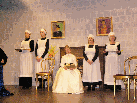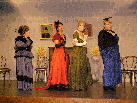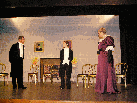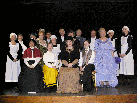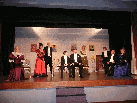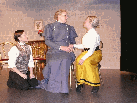|
A Woman of No Importance by Oscar Wilde - directed by Daniel Curley
Critic's Comments:-
""THE essential thing for a tie is style."
And for Wilde, too.
Daniel Curley's impressive production of A Woman of No Importance began with an empty stage, peopled first with chairs. then with stares, as the cast peered at one another in a striking tableau.
The first part of the play is all words, with the witty aphorisms leavening the introduction of the characters and their milieu. The social commentary/melodrama comes to the boil after the interval.
It's a tough blend to bring off, but Phoenix scored some notable successes, in the Act III climax, for instance, or the resolution In Act IV.
Paulette Harris gave a strong performance in the title role; different from other women, expressing her deep hurt with stillness and sincere emotion.
Quite unlike the society ladies whose company she has avoided: Lady Caroline [a splendid Liz Curley] or the flirty Mrs Allonby [Tricia Childs] or the mousey Lady Stutfield, a well-judged cameo from Faye Armstrong, picking up what few laughs were to be had from the first night audience.
The thoroughly bad Lord Illingworth, surrounded by sycophantic laughter, was Geoff Hadley, and his illegitimate son, the object of his desire, according to some commentators, was a dapper Louise Curley. Her sister Josephine played the Puritan, whose straight state-side talking cut through the hypocrisy of the British aristocracy.
A very promising start to this, Phoenix's Golden Anniversary year."
Michael Gray-Weekly News
---------------------
"With one basic set of flats and with only chairs and an occasional table as larger props, determined by the constraints within the venue, Daniel Curley did extremely well to pull off the psychological illusion, if not the visual one, of creating four different scenes. Modest changes to pictures on the wall were augmented significantly by the gentle choreography, if that is its correct term, that involved intricate movement of chairs by the maids and the entrance and exit of the company, sometimes accompanied by modest curtseying or bowing but always with expressionless faces that gave away nothing about character or status. Musical accompaniment complemented the mood created and served to make a definite punctuation between Acts. Casting was very strong and the use of ladies in certain men's roles - a consequence I presume of lack of men rather than a deliberate choice - worked well. As a newcomer to this play I was ignorant of the characters and assumed that Liz Curley's superbly self-righteous and opinionated Lady Pontefract was the lead, and so I settled in to enjoy the wonderful dialogue and sneering dominance of this woman amongst equally accomplished hostess, Lady Hunstanton (Angela Gee), the quizzical, almost na´ve and yet so eager to learn Lady Stutfield (Faye Armstrong) and the suggestive woman of the world, Mrs Allenby (Tricia Childs). To a modern audience the dialogue is only mildly amusing in parts and we were perhaps more engaged by the facial tics of Lady Pontefract and the weary resignation of her hen-pecked husband, played by Syd Smith. However, in its day the hypocrisy highlighted must have been extremely funny bordering on seditious, depending on your place in the spectrum of women's emancipation. Lord Illingworth, played by Geoff Hadley, exemplified all that was wrong in society at the time, although society's attitudes to sexual liberation have not changed so very much in some ways. With a definite look of amusement in his eyes at all times and with some of Wilde's most classic lines to deliver Hadley captured the rogue, legitimized by wealth and status, very well indeed. Josephine Curley, as the American puritan, Miss Hester Worsley, was excellent. Her gentle American accent did not grate as some can but elicited trust, sympathy and was the perfect outsider upon which the Victorian ladies could heap their xenophobic opprobrium. Even Hester's costume, simple white blouse and skirt, contrasted sharply with the showy silk gowns of the superficial socialites with whom she did verbal battle. Louise Curley, as the young Gerald Arbuthnot, in love with Hester, was fluent and at ease on stage. Only his (her) threats to kill Lord Illingworth for dishonouring his mother were slightly underplayed but this may be an isolated example of where the gender crossover didn't quite work. My final comments must dwell on Mrs Rachel Arbuthnot, played by Paulette Harris. Despite her tall physical presence this did not overshadow her ability to play the almost apologetic, socially inferior, woman living a lie in the midst of a seething cauldron of gossip and hypocrisy. Her soliloquy was extremely moving; her use of facial expression to show emotion was excellent but constrained as a product of a Victorian upbringing would have been. The range of emotions, from utter disdain for Lord Illingworth, to love for her son and the mental anguish as she weighed up the risk of losing her son physically (to live his father) or losing her son's love (by confessing the truth about her former relationship) were all revealed masterfully. As I am sure the audience all agreed this was a woman of considerable importance."
Stewart Adkins-National Operatic and Dramatic Association
Return to top
|
|


